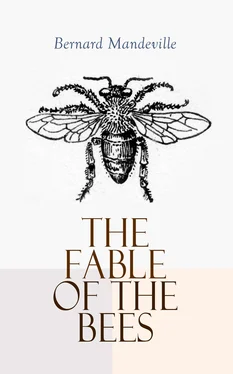Authors are always allowed to compare small things to great ones, especially if they ask leave first. Si licit exemplis, &c. but to compare great things to mean trivial ones, is unsufferable, unless it be in burlesque; otherwise I would compare the body politic (I confess the simile is very low) to a bowl of punch. Avarice should be the souring, and prodigality the sweetening of it. The water I would call the ignorance, folly, and credulity of the floating insipid multitude; while wisdom, honour, fortitude, and the rest of the sublime qualities of men, which separated by art from the dregs of nature, the fire of glory has exalted and refined into a spiritual essence, should be an equivalent to brandy. I do not doubt but a Westphalian, Laplander, or any other dull stranger that is unacquainted with the wholesome composition, if he was to sell the several ingredients apart, would think it impossible they should make any tolerable liquor. The lemons would be too sour, the sugar too luscious, the brandy he will say is too strong ever to be drank in any quantity, and the water he will call a tasteless liquor, only fit for cows and horses: yet experience teaches us, that the ingredients I named, judiciously mixed, will make an excellent liquor, liked of, and admired by men of exquisite palates.
As to our vices in particular, I could compare avarice, that causes so much mischief, and is complained of by every body who is not a miser, to a griping acid that sets our teeth on edge, and is unpleasant to every palate that is not debauched: I could compare the gaudy trimming and splendid equipage of a profuse beau, to the glistening brightness of the finest loaf sugar; for as the one, by correcting the sharpness, prevent the injuries which a gnawing sour might do to the bowels, so the other is a pleasing balsam that heals and makes amends for the smart, which the multitude always suffers from the gripes of the avaricious; while the substances of both melt away alike, and they consume themselves by being beneficial to the several compositions they belong to. I could carry on the simile as to proportions, and the exact nicety to be observed in them, which would make it appear how little any of the ingredients could be spared in either of the mixtures; but I will not tire my reader by pursuing too far a ludicrous comparison, when I have other matters to entertain him with of greater importance; and to sum up what I have said in this and the foregoing remark, shall only add, that I look upon avarice and prodigality in the society, as I do upon two contrary poisons in physic, of which it is certain that the noxious qualities being by mutual mischief corrected in both, they may assist each other, and often make a good medicine between them.
Line 180.————Whilst luxury
Employ’d a million of the poor, &c.
If every thing is to be luxury (as in strictness it ought) that is not immediately necessary to make man subsist as he is a living creature, there is nothing else to be found in the world, no not even among the naked savages; of which it is not probable that there are any but what by this time have made some improvements upon their former manner of living; and either in the preparation of their eatables, the ordering of their huts, or otherwise, added something to what once sufficed them. This definition every body will say is too rigorous: I am of the same opinion; but if we are to abate one inch of this severity, I am afraid we shall not know where to stop. When people tell us they only desire to keep themselves sweet and clean, there is no understanding what they would be at: if they made use of these words in their genuine proper literal sense, they might be soon satisfied without much cost or trouble, if they did not want water: but these two little adjectives are so comprehensive, especially in the dialect of some ladies, that nobody can guess how far they may be stretched. The comforts of life are likewise so various and extensive, that nobody can tell what people mean by them, except he knows what sort of life they lead. The same obscurity I observe in the words decency and conveniency, and I never understand them, unless I am acquainted with the quality of the persons that make use of them. People may go to church together, and be all of one mind as much as they please, I am apt to believe that when they pray for their daily bread, the bishop includes several things in that petition which the sexton does not think on.
By what I have said hitherto I would only show, that if once we depart from calling every thing luxury that is not absolutely necessary to keep a man alive, that then there is no luxury at all; for if the wants of men are innumerable, then what ought to supply them has no bounds; what is called superfluous, to some degree of people, will be thought requisite to those of higher quality; and neither the world, nor the skill of man can produce any thing so curious or extravagant, but some most gracious sovereign or other, if it either eases or diverts him, will reckon it among the necessaries of life; not meaning every body’s life, but that of his sacred person.
It is a received notion, that luxury is as destructive to the wealth of the whole body politic, as it is to that of every individual person who is guilty of it, and that a national frugality enriches a country in the same manner, as that which is less general increases the estates of private families. I confess, that though I have found men of much better understanding than myself of this opinion, I cannot help dissenting from them in this point. They argue thus: We send, say they, for example, to Turkey of woollen manufactury, and other things of our own growth, a million’s worth every year; for this we bring back silk, mohair, drugs, &c. to the value of twelve hundred thousand pounds, that are all spent in our own country. By this, say they, we get nothing; but if most of us would be content with our own growth, and so consume but half the quantity of those foreign commodities, then those in Turkey, who would still want the same quantity of our manufactures, would be forced to pay ready money for the rest, and so by the balance of that trade only, the nation should get six hundred thousand pounds per annum .
To examine the force of this argument, we will suppose (what they would have) that but half the silk, &c. shall be consumed in England of what there is now; we will suppose likewise, that those in Turkey, though we refuse to buy above half as much of their commodities as we used to do, either can or will not be without the same quantity of our manufactures they had before, and that they will pay the balance in money; that is to say, that they shall give us as much gold or silver, as the value of what they buy from us, exceeds the value of what we buy from them. Though what we suppose might perhaps be done for one year, it is impossible it should last: Buying is bartering; and no nation can buy goods of others, that has none of her own to purchase them with. Spain and Portugal, that are yearly supplied with new gold and silver from their mines, may for ever buy for ready money, as long as their yearly increase of gold or silver continues; but then money is their growth, and the commodity of the country. We know that we could not continue long to purchase the goods of other nations, if they would not take our manufactures in payment for them; and why should we judge otherwise of other nations? If those in Turkey, then, had no more money fall from the skies than we, let us see what would be the consequence of what we supposed. The six hundred thousand pounds in silk, mohair, &c. that are left upon their hands the first year, must make those commodities fall considerably: Of this the Dutch and French will reap the benefit as much as ourselves; and if we continue to refuse taking their commodities in payment for our manufactures, they can trade no longer with us, but must content themselves with buying what they want of such nations as are willing to take what we refuse, though their goods are much worse than ours; and thus our commerce with Turkey must in few years be infallibly lost.
Читать дальше












